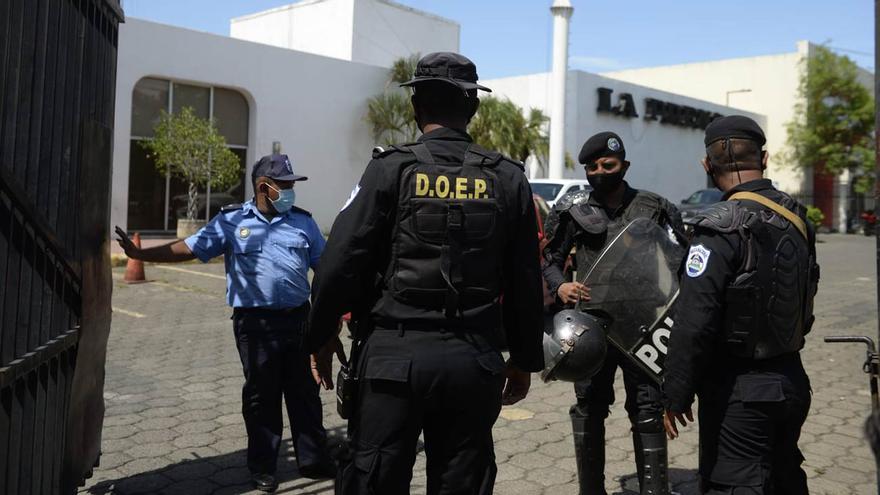
![]() EFE (via 14ymedio), Miami, 21 April 2022 — The Inter-American Press Association (IAPA) concluded its biannual meeting this Thursday with a pessimistic document in which it maintains that “the increasing violence against journalists is the main challenge to the free press in the Americas,” but there are other challenges, also on the economic level.
EFE (via 14ymedio), Miami, 21 April 2022 — The Inter-American Press Association (IAPA) concluded its biannual meeting this Thursday with a pessimistic document in which it maintains that “the increasing violence against journalists is the main challenge to the free press in the Americas,” but there are other challenges, also on the economic level.
The panorama of press freedom on the continent is “bleak,” according to the media organization based in Miami (Florida), which will hold its next General Assembly next October in Madrid in person.
The three-day virtual meeting that ended today produced a series of resolutions on various topics, reports on the state of press freedom in each country, and a document of conclusions that lists the many problems from greater to lesser seriousness and highlights some positive elements.
At the closing of the meeting, the SIP Bot, a digital tool at the service of press freedom, was presented.
This tool allows journalists to track the treatment of the issue of press freedom in the media and social networks in real time and has a complaints mailbox to send violation alerts to the IAPA.
According to the conclusions of the meeting, since October 2021, 15 journalists have been murdered (10 in Mexico, 3 in Haiti, one in Guatemala and one in Honduras) and 13 of these crimes occurred in the first three months of 2022.
“The impunity of these crimes continues to be worrying,” said the IAPA, recalling that this year nine cases of murders against journalists that occurred in 2002 in Colombia will prescribe.
“In Cuba, Nicaragua and Venezuela, journalists and the media are unusually frequent victims of persecution and repression by totalitarian governments,” emphasizes the IAPA
Eight communicators, six from Nicaragua – three reporters and three directors of La Prensa – and two from Cuba, suffer imprisonment, and 77 were forced into exile: 75 from Nicaragua and two from Cuba.
With respect to Nicaragua, the document’s conclusions highlight the approval of a resolution in which 27 national and international press organizations assume an action plan to restore the freedoms of the press and expression as essential guarantees to restore democracy.
“The independent press in Nicaragua experiences systematic persecution, oppression and widespread censorship – atrocities resulting from the hijacking of public powers and the demolition of civil society structures,” says the IAPA.
The action plan contemplates requesting multilateral organizations to condition the granting of credits and non-humanitarian aid to the release of political prisoners, to return their facilities to La Prensa, Confidencial and 100% Noticias, to allow the return of media and journalists from exile and have guarantees to carry out their work.
The arson attacks against two media outlets in Argentina and two in Colombia, as well as the digital surveillance of journalists in Cuba, El Salvador and Venezuela, also are sources of concern.
Regarding Venezuela, it is highlighted that Nicolás Maduro’s “regime” blocked Internet portals and censored access to the network in general, using international telecommunications companies.
“The reform of the Penal Code in Cuba increases penalties for contempt of authority, creates offenses to penalize users of social networks and punishes “clandestine publications” with prison and fines,” the report details.
Other restrictive projects emerged in Aruba, with the media law, and in El Salvador, with the anti-gang statute that criminalizes the media and journalists.
The stigmatization of the press by presidents or other authorities practiced in Argentina, Aruba, Brazil, Colombia, Costa Rica, Ecuador, El Salvador, Guatemala, Mexico, Peru and Venezuela is already a constant.
The resolution also mentions the restrictions on access and information coverage in Aruba, Bolivia, Canada, Costa Rica, Cuba, the United States, Guatemala, Paraguay, Peru, Puerto Rico, the Dominican Republic and Venezuela.
Judicial harassment was reported in Argentina, Brazil, Cuba, the United States, Guatemala, Nicaragua, Panama, Paraguay and Peru.
Despite all this, the IAPA highlighted that in the last six months there were some positive aspects.
In Honduras, the Secrets Law was repealed, in Paraguay a bill on protection for journalists is advancing, and in Puerto Rico bills were submitted to protect confidential sources.
The IAPA also sees as a light that the Government of Canada promotes a law to force the large digital platforms to pay the media for the use of their content.
At the six-monthly meeting, the urgency of ensuring the sustainability of the press was discussed again, which includes receiving, “without further delay,” fair compensation from the large digital platforms for the use of the content generated by the media.
The IAPA highlighted that the economic crisis in the media has deepened because digital platforms absorb a very high percentage of digital advertising.
With their technology, data on audiences, economic resources and, above all, with journalistic content, these supranational companies have created a very successful revenue model to the detriment of the newspaper industry, said IAPA President Jorge Canahuati.
“We are not asking for gifts or subsidies (…). We are claiming our royalties. (…) We cannot evade our responsibilities and the platforms should not evade theirs either,” he added.
____________
COLLABORATE WITH OUR WORK: The 14ymedio team is committed to practicing serious journalism that reflects Cuba’s reality in all its depth. Thank you for joining us on this long journey. We invite you to continue supporting us by becoming a member of 14ymedio now. Together we can continue transforming journalism in Cuba.
